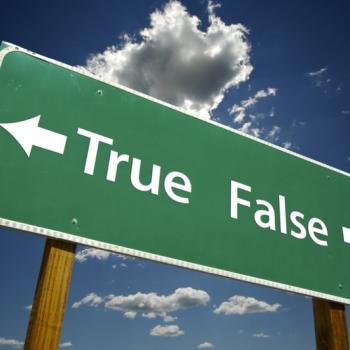Now Featured at the Patheos Book Club
Stealing from God
Why Atheists Need God to Make Their Case
by Frank Turek
In February of 2012 the renowned atheist Richard Dawkins was on a live radio program in a dialogue/debate with Reverend Giles Fraser, a priest of the Church of England. In his customary diatribe against Christians and the Christian faith, Dawkins quoted from a recent poll that purportedly measured Christianity in Britain. The controversial study from which he drew his "facts" was commissioned by the Richard Dawkins Foundation for Reason and Science. Among the findings, the study apparently found that nearly two-thirds of individuals surveyed couldn't name the first book of the New Testament (Matthew). Whatever that was intended to prove, Dawkins drew the conclusion that Christianity was waning in Europe.
Giles Fraser took issue with this indicator, claiming that it was improper for Dawkins to make such huge leaps on that basis. Fraser unequivocally proved his point. He asked Richard Dawkins if he could name the full title of Darwin's On the Origin of Species. Since that was his "holy book" and he was the high priest of Darwinism, with a doctorate in biology to boot, the title ought to have been at his fingertips. After Dawkins claimed that he could recite the title (which happens to be quite long), Fraser said, "Go ahead, Richard." Dawkins nervously thought out the answer, allowing himself a few moments as he shuffled his words. He began with the familiar first five words and then stumbled and blurted, "Uh. With," and at last said, "Oh God." He couldn't remember the full title.
That last line is incredibly hilarious, coming from the atheist's own vocabulary. It ought to have made the comedic late-night shows' lowlights of the day. In some cases it did.
One can put the knife to the side and say that the amazing evidence of God's sovereignty is revealed in how even those who don't believe in Him call upon Him to remind them of the source that paved the way to their disavowal of belief in His existence. It is like stepping on a bridge to cross a chasm, all the while believing there is no bridge.
Granted, calling upon God in that tone and manner was at best a Freudian slip of a familiar phrase that was nothing more than just a blip of a sound bite to buy time. But then it doesn't really stop there, does it? Apart from Dawkins defeating his own point, he needs to ponder his own system of thought. Most recently, he was outraged at an English player "cheating" in a cricket match against the Australians. He castigated the player, calling him a cheat, and hoped England would lose the series because of that dishonesty. Well, needless to say, the opinion box was full, ranging from a reminder to Dawkins to chill out—it was only a game—to those reprimanding him that cheating is not really evil as one merely "dances to his DNA." (That last phrase was Dawkins' own term elsewhere, on our morally determined software.) Dawkins was not amused by such put-downs.
From a Freudian slip to a "wish for judgment" upon the cheats, atheists often blunder into the right by borrowing from assumptions that are not logically deduced from their own worldview. But their opinion is so strong that they straddle the two worlds and make up a bridge because they have reached an unbridgeable chasm, given their starting point. It is to the more serious "borrowing" of this sort that Frank Turek points—and rightly brands it "stealing."
I have had the privilege of traveling the globe for over forty years, speaking at scores of university open forums. In nearly every setting, I have encountered an atheist who charges Christianity with being illogical, irrational—or worse, a poison to society. And yet, as we talk, time and again the atheist is unable to answer the fundamental questions of life, such as, "Is there a moral framework to life?" To be sure, they try and keep trying. But there is a difference between offering a pragmatic explanation and all the while being unable to anchor it in logical inescapabilty. That is the demand atheists make of the Christian in origins, but they fail to meet their own tests in meaning and morality. These are serious questions of life and have to be faced by every worldview. Atheists stumble on these obstacles to coherence, and what is more, intuitively borrow from the very worldview they disavow to legitimize their own. The haunting question keeps resurfacing. Are the moral judgments we make reflective of a reality that is not just a preference of values but is in some nature binding upon us?
As Frank Turek's own debates and thorough research reveal, the atheistic position breeds more rational dissonance than so-called evidence against God. For instance, to atheists, the presence of evil is troubling with a double edge. From where do they even get the category of evil? And second, how do they break its stranglehold? To the Christian theist, good and evil have a point of reference: God, who is the moral lawgiver and who offers us forgiveness, grace, and restoration through His Son, Jesus Christ. But atheists cannot even justify the existence of good and evil without smuggling in the moral argument for God. To put it simply, when you assert that there is such a thing as evil, you must assume there is such a thing as good. When you say there is such a thing as good, you must assume there is a moral law by which to distinguish between good and evil. There must be an ontic referent by which to determine what is good and what is evil. When you assume a moral law, you must posit a moral lawgiver because the questioner assumes the intrinsic worth of humanity in raising the question of evil, an assumption that is not warranted by naturalism. But this moral lawgiver is precisely who atheists are trying to disprove. Without that moral lawgiver, humanity is an existent entity without an essential worth other than some self-referencing sleight of hand.




